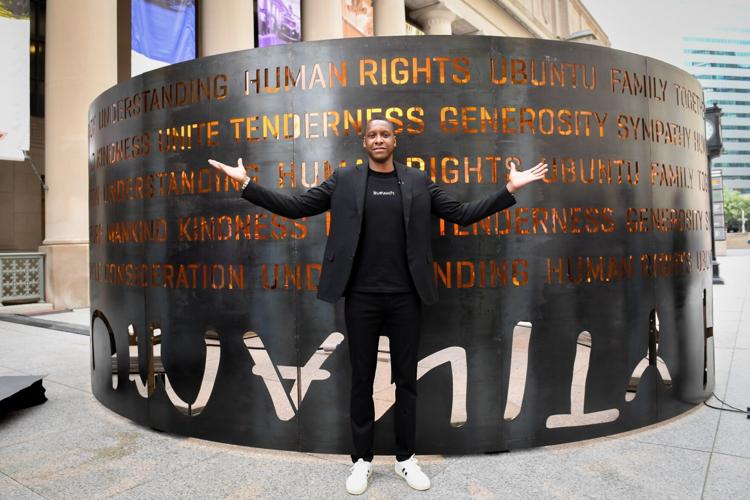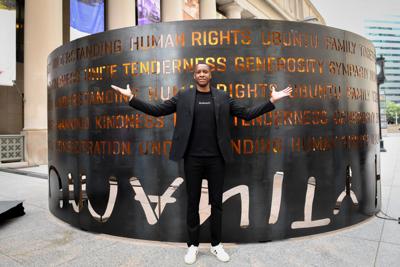It was in 2006 when Bryan Colangelo called to say heŌĆÖd hired a director of international scouting for the Raptors, and that IŌĆÖd probably want to talk to the young man because he was an interesting dude with a promising future.
Colangelo, then the Raptors president and general manager, was a pretty good judge of people, thatŌĆÖs for sure. When it came to adding interesting folks heŌĆÖd brought Maurizio Gherardini to town, poached Marc Eversley from Nike and had generally populated the Raptors front office with a unique blend of personality.
So, off it was to the teamŌĆÖs offices, where there was this quick-talking, quite charming, obviously passionate guy whose tiny office overlooking the train tracks at Union Station was dominated by a picture of Nelson Mandela.
After that half-hour chat, spent mostly talking about the world, was the moment I got a feeling that this Masai Ujiri guy isnŌĆÖt your run-of-the-mill basketball scout. HeŌĆÖs going to be something, somewhere, somehow.
Fast forward almost two decades, broken up by a hiatus in Denver, and one personal feeling is that Ujiri enriched us with far more than his impressive basketball talents.
What I got to know about Ujiri more than anything in all those years was his singular belief in the words of Mandela and how they resonate: “Sport has the power to change the world. It has the power to inspire. It has the power to unite people in a way that little else does. It speaks to youth in a language they understand. Sport can create hope where once there was only despair. It is more powerful than governments in breaking down racial barriers. It laughs in the face of all types of discrimination.”

Masai Ujiri meets four-year-old Everton and his grandmother Olive as Giants of Africa unveils its new basketball courts at Firgrove Park in ╬┌č╗┤½├Į last year.
Nick Lachance ╬┌č╗┤½├Į StarTo me, Ujiri leaves ╬┌č╗┤½├Į with a sports legacy that should be the envy of any executive. It hasnŌĆÖt been the greatest of times these last two years, but thatŌĆÖs far too short-sighted a viewpoint.
The Raptors won. They won big, they won often, and under UjiriŌĆÖs leadership they became one of the very best franchises in the NBA. The stumbles of two seasons? Yeah, theyŌĆÖre real and they have to be corrected, but I think the franchise is poised to do that. And besides, in the totality of his reign the Raptors never cheated the fans. Did they hit 100 per cent? No one ever does. And Ujiri never did. He told me that often.
But I cannot shake what Ujiri meant in the greater picture and how important it was. For the Raptors. For ╬┌č╗┤½├Į. For Canada. He fought every important fight with passion and intent and vigour, and there has never been a more encompassing sports executive who ever lived in this country.
From the very day┬ĀI met him, he advanced the causes of women, of Indigenous people, of those less fortunate. He cared about big things and, I hope, he got some of us to care about them, too.
I saw him with young kids ŌĆö boys and girls from every society strata ŌĆö and the way he got to them was tangible. He insisted that they could be great, that they mattered, that chances would be made available to them or heŌĆÖd die trying.
What he did was awaken an awful lot of people to a lot of important issues, and his undying passion had to be contagious.
One of the very best perks of this job┬ĀŌĆö the one thing everyone wants to talk about ŌĆö is┬Āthe games you get to see, the events you get to attend, the places youŌĆÖre lucky enough to have visited.

Masai Ujiri and WNBA ╬┌č╗┤½├Į team president Teresa Resch pose for a photo during a press conference announcing the city’s new franchise last year.
Christopher Katsarov/The Canadian PressAnd thatŌĆÖs all true┬ĀŌĆö itŌĆÖs been an amazing ride and itŌĆÖs still going ŌĆö but I always counter with this: Long after those games are forgotten and the sights fade from memory, what you remember are the men and women youŌĆÖve been fortunate to know, to learn from, to count among friends.
Yes, there were basketball things that Ujiri did and I didnŌĆÖt agree with. There were moves he made that didnŌĆÖt work out, and thatŌĆÖs par for the course for any executive. Fans can and will debate them, and thatŌĆÖs fine.
What I hope fans can remember above all else was UjiriŌĆÖs passion, the hopes he carried about making the world better, long outside of any arena.
MLSE CEO Keith Pelley said the decision to replace Ujiri was his, without explaining why. We can put the pieces together.
MLSE CEO Keith Pelley said the decision to replace Ujiri was his, without explaining why. We can put the pieces together.
The Raptors as a basketball team will be fine. Bobby Webster is eminently capable of leading an organization, to make the trades and draft picks and transition that can return the team to prominence.
╬┌č╗┤½├Į,┬Āthough, will be lesser off because of Ujiri’s departure. We were enriched by what he did away from the game, by what he accomplished in the greater society.
I knew it that first day, and I know it today.
Masai Ujiri will be missed because of the man he is, not the sports executive he was.


































To join the conversation set a first and last name in your user profile.
Sign in or register for free to join the Conversation